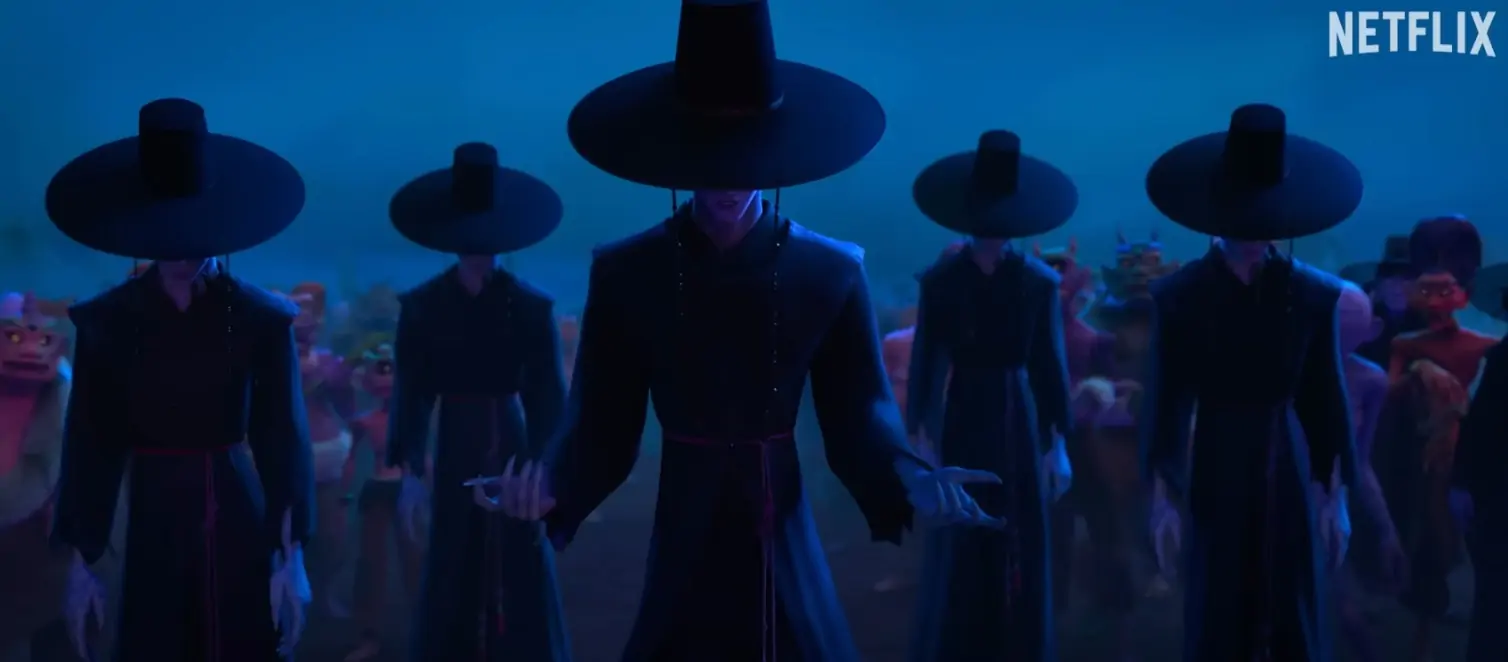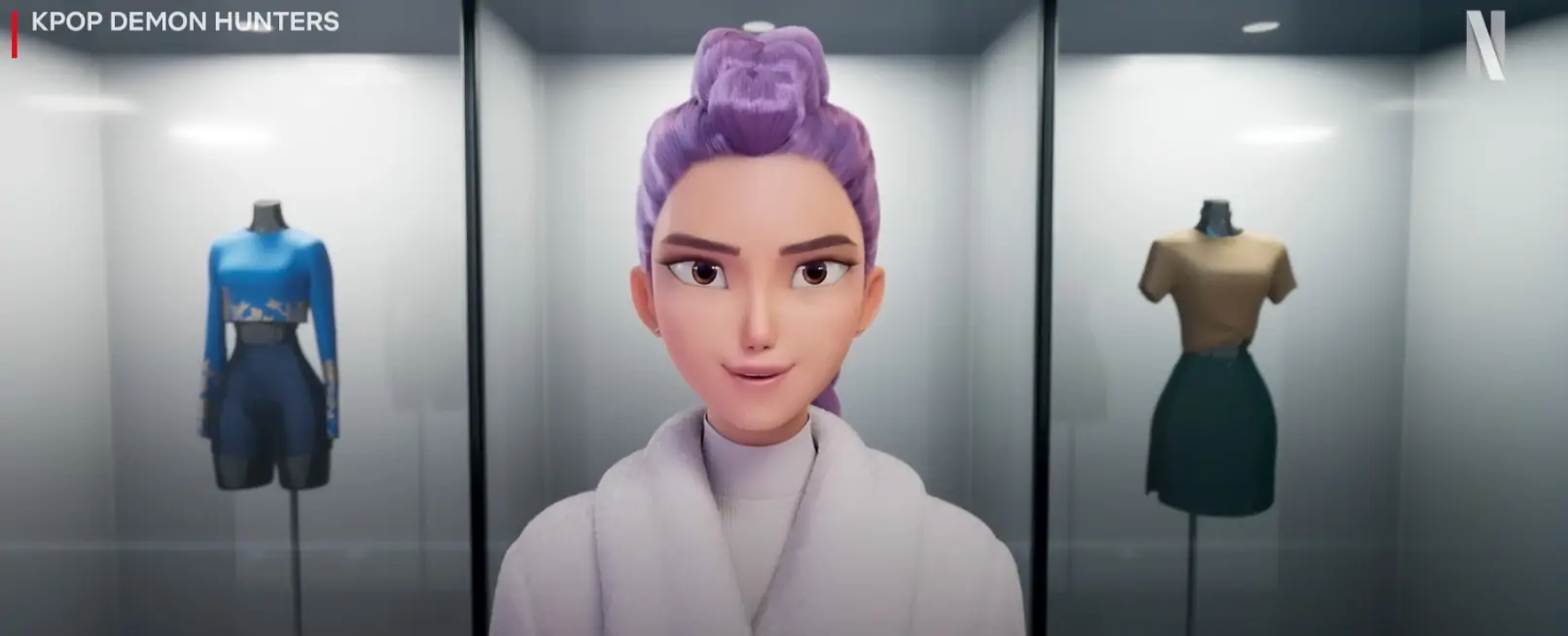
Over the weekend, Netflix achieved a rare feat: it secured the top spot at the US box office for the first time. The anime musical “KPop Demon Hunters” outperformed traditional cinema releases, earning an estimated $18-$20 million, even though it’s available to stream on Netflix globally. However, this triumph is overshadowed by secrecy, contradictory reports, and Netflix’s unwillingness to disclose precise figures.

It’s no coincidence that there’s confusion about the performance of “KPop Demon Hunters.” Netflix has a history of maintaining secrecy about its box office earnings, even when their movies are screened in multiple theaters numbering in the thousands. This secrecy makes it challenging for tracking firms, analysts, and journalists to accurately determine the film’s success. Different sources provide varying figures – Reuters claims approximately $20 million, Vulture suggests around $18 million, while Variety has given a range between these two numbers.
Without official confirmation, it’s guesswork.
The foggy situation surrounding Netflix’s achievements in the entertainment industry has brought about discontent among observers, as they perceive that Netflix is reaping the rewards of success while evading the responsibility that comes with transparent data sharing. This circumstance naturally triggers a question: Why does Netflix find it necessary to make it challenging to track their box office performance?
Why Netflix Hides Box Office Numbers
Netflix has several motives behind concealing ticket sales figures during its brief cinema releases.
1. Protect the Streaming Business Model
Netflix primarily operates outside the conventional world of cinematic box office. Instead, movie theaters serve as promotional platforms for their subscription-based service. If Netflix were to disclose precise box office earnings, it could lead to comparisons with established studios like Disney, Universal, or Warner Bros., which heavily rely on theatrical revenue, potentially creating an uneven playing field.

By staying opaque, Netflix avoids being boxed in and keeps the focus on streaming viewership.
2. Avoid Setting Precedent
If Netflix only reports their box office figures on occasion, there might be increasing expectations for them to disclose these numbers each time. Doing so would leave a trace of films that underperformed during limited releases, potentially harming the company’s desired image. By keeping the numbers confidential, it could result in no preconceived expectations moving forward.
3. Control the Narrative
By presenting “KPop Demon Hunters,” Netflix is able to enjoy a double advantage: news outlets can proclaim “Netflix dominates the weekend,” all while avoiding debates about whether the movie grossed $18 million, $20 million, or even less in earnings.

Vague estimates let the company enjoy positive coverage without hard accountability.
4. Industry Leverage
Mainly, most movie studios in Hollywood disclose their box office earnings through Comscore, a system essential for both cinemas and analysts. However, Netflix operates differently, not following these standard practices. This sets them apart – causing cinema exhibitors to adapt to their unique terms instead.
One method is to demonstrate dominance by shaping the relationship with an industry that’s still figuring out how to collaborate effectively with a company primarily focused on streaming.
5. Strategic Obscurity in Global Markets
The popularity of “KPop Demon Hunters” extends beyond borders, particularly in Asia. However, should the exact figures be disclosed, they might unveil discrepancies – notably a stronger following in South Korea and Japan compared to North America.

Hiding the setbacks enables Netflix to allow the “Top Ranked in America” narrative to take center stage in media coverage, without having to delve into or clarify their inconsistent performance in other regions.
What This Means for Netflix Going Forward
As a devoted fan, I must say that the triumph of KPop Demon Hunters could’ve been a pivotal milestone for Netflix, demonstrating that their streaming titles can indeed rival theatrical releases. However, it seems Netflix opted to stick with its familiar approach of secrecy instead. Now, we’re left with speculations instead of solid figures, and the discourse has transformed from “wow, look how massive this was” to a puzzling “why won’t Netflix share more?

Hiding the ticket sales for “KPop Demon Hunters” might support Netflix’s strategy, but it casts doubt on the authenticity of their victory. If this series really outperformed other movies at the box office over the weekend, why keep the financial details under wraps? Until Netflix clarifies this, every claimed success will be met with suspicion.
Read More
- Where Winds Meet: How To Defeat Shadow Puppeteer (Boss Guide)
- Survivor’s Colby Donaldson Admits He Almost Backed Out of Season 50
- Resident Evil Requiem cast: Full list of voice actors
- Gold Rate Forecast
- Best Controller Settings for ARC Raiders
- Best Thanos Comics (September 2025)
- The 10 Best Episodes Of Star Trek: Enterprise
- How to Build a Waterfall in Enshrouded
- Best Shazam Comics (Updated: September 2025)
- Fuuraiki 5 coming to PC
2025-08-25 21:57